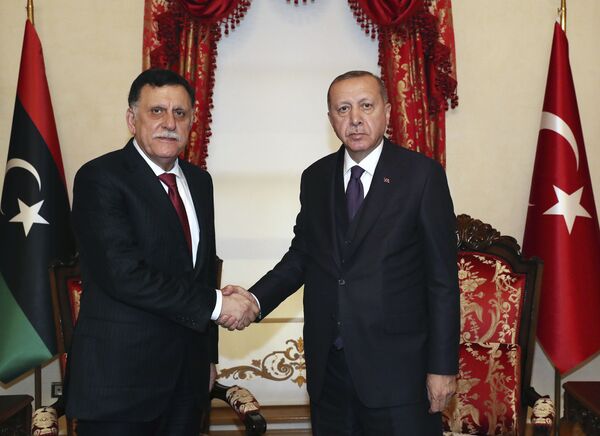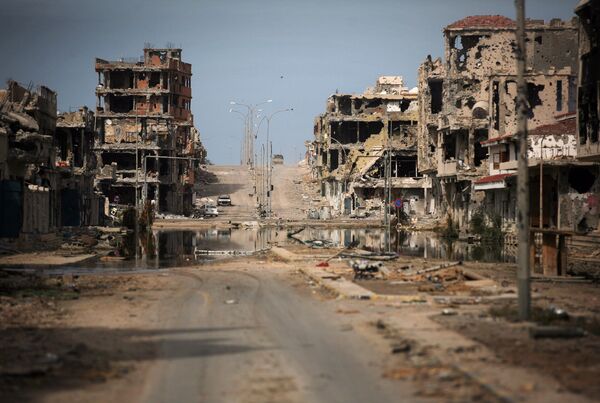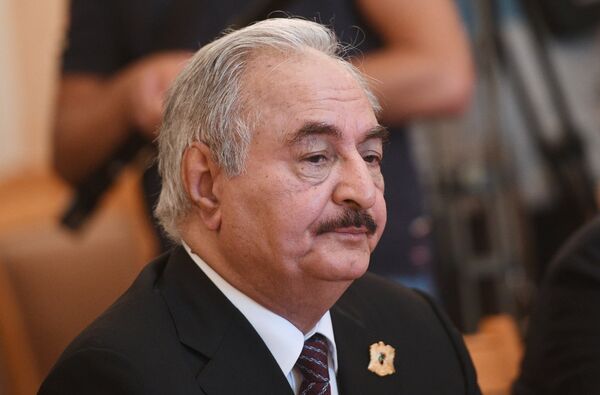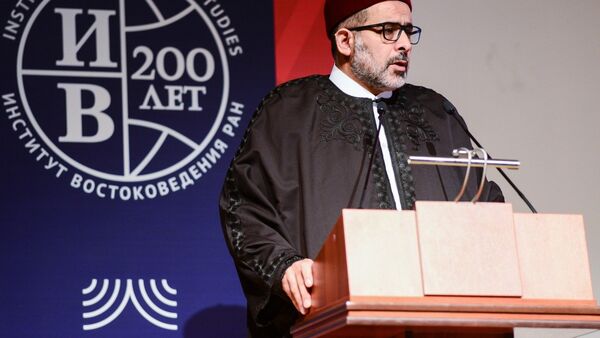Aref Ali Nayed, a personal envoy of Prime Minister Abdullah Thani, is currently paying a visit to Russia and has shared details of his trip to Russia against the backdrop of the ongoing crisis in Libya and the ratification of a military cooperation memorandum between Turkey and the GNA.
Sputnik: What is the purpose of your current visit to Russia? Whom have you met with?
Aref Ali Nayed: I am here on a trip to discuss with our Russian counterparts the current situation in Libya. I met with His Excellency Mikhail Bogdanov, the personal representative of President Putin in the Middle East and Russia’s deputy foreign minister, plus some of the file experts on Libya at the Foreign Ministry.
Sputnik: Could you share more details about the discussions that you had with Russian diplomats? Which aspects of the Libyan crisis did you touch upon?
Aref Ali Nayed: I came on an urgent basis in order to address the emerging crisis caused by the illegal signing of agreements between Turkey and Fayez al-Sarraj's Presidential Council and the so-called Government of National Accord.
The Turks and Sarraj signed two agreements – one for maritime demarcation and one for defence and security – both of which are totally illegal for two reasons. First of all, Sarraj does not have the authority to sign these agreements because the Presidential Council is missing half of its members and he never obtained parliamentarian confidence, even though he tried twice to form a government. The second reason for the invalidity of these agreements is the fact that the Libyan parliament has neither seen these agreements nor approved these agreements. We saw in the media that the Libyan parliament issued very strong statements rejecting these agreements and also said that Sarraj is not authorised to sign them. So these agreements have not been ratified by the Libyan parliament, and therefore, as far as Libyan and international laws are concerned, they have no validity whatsoever, they are null and void.

We have also been very concerned with public speeches by Erdogan of Turkey, where he has tried to invoke the excuse when he said that there were one million Libyans of Turkish origin. He said there are one million Turks in Libya, which is a complete insult to the Libyan people. We are all Libyans, we do not distinguish on the basis of race, because that is the racism of a bygone period of the 1920s and 1930s. Maybe Erdogan is following Ataturk’s racism, but we are not racist in Libya. Arabs, Turks, Tebu, Tuareg, and Amazigh are all equal. Unfortunately, Erdogan is trying to discriminate between Libyans and to basically portray Libyans of Ottoman origins as a fifth column within the country and he is claiming that he is coming to defend them!
He is threatening to send soldiers on the ground and this is totally rejected by the vast majority of the Libyan people. There have been massive rejections and statements by all the tribal groupings in Libya and by civil society members, including women and youth organisations. Libyans are against this kind of threat of the use of military force to try to impose an Islamist regime on us, which continues to abuse the Libyan people and abuse the oil resources – the vast oil resources in Libya – as an ATM machine for transnational Islamist ambitions.
Unfortunately, Erdogan seems to be in a time warp – he thinks that he is Sultan Abdul Hamid and acts like an Ottoman sultan, trying to reclaim the Ottoman holdings of the pre-World War I period. This is very dangerous for the entire security balance of the Mediterranean and the region, and it is causing major tensions with various countries, including Egypt, Greece, Cyprus, and other nations of the Mediterranean.
I have been on a diplomatic mission to engage the European Union, and I have worked very closely with the Greeks and the French in order to get the European Union to take a stance. And they have made a very strong stance against the Turkish-Sarraj agreements, and now I am in Moscow to make sure that we are on the same page with Russia, to ensure that Russia firmly opposes these illegal agreements.
Sputnik: So, as far as I understand, you're saying that you also visited France and Greece to discuss the nature of these agreements?
Aref Ali Nayed: I met with the foreign minister of Greece in the UAE, when he was visiting the Middle East, and then arranged for the receiving of the head of our parliament by the head of the Greek parliament. I also arranged for the visit by His Excellency the foreign minister of Greece to Benghazi recently.
I came from France just now. I worked closely with the French presidency on the positioning of France vis-à-vis these agreements.
Sputnik: Speaking about your diplomatic efforts – you reportedly visited the United States in November. Could you tell us more about this visit?
Aref Ali Nayed: It was with the same purpose of supporting the Libyan parliament, the elected parliament, which is the only legitimate representative of the Libyan people, and the interim government headed by Abdullah al-Thani, and also the Libyan National Army – which is not any person's army, but is the army of the elected Libyan parliament, something that should always be remembered. The parliament is simply trying to regain the capital after it was kidnapped by Islamist radicals in 2014. And they have been in control of the Central Bank of Libya and the National Oil Company and the Libya Investment Authority ever since. So the army of the Libyan parliament is trying to get back the capital of the Libyan parliament.
And that is the essence of this war, which is a very different picture from what is portrayed by the Muslim Brotherhood propaganda machine, which has five television stations broadcasting out of Istanbul and also uses PR companies in America like Mercury and Gotham in order to promote a completely different narrative – a narrative that makes it sound like there is a rebellious army of one man against the legitimate government, which is not the case.
This rebellion is against the so-called Presidential Council and Government of National Accord, which is really the Government of National Discord. The legitimate Libyan parliament is trying to oust them out of the capital Tripoli in order to be able to be fully in control of the resources of Libya, which unfortunately since 2014 have been used by terrorist organisations headed by the Muslim Brotherhood.
Sputnik: Could you, however, tell us more about your visit to the United States?
Aref Ali Nayed: I visited the National Security Council and the US State Department. I also had meetings with the IMF, World Bank, and the Department of Energy.
Sputnik: One more question about the diplomatic efforts to solve the Libyan crisis. As you probably know, Berlin is expected to host a conference on the Libyan peace process early next year, in January. Do you know the specific dates, by any chance? What’s your take on this?
Aref Ali Nayed: The dates are still unclear, and also the level of representation is still quite questionable. And there is a lot of vagueness on what can be achieved and what cannot be achieved. I met with Mr Ghassan Salamé and his deputy Ms Stephanie Williams in Cairo last week, and I pointed out that Berlin is a commendable effort, however, it has some vital shortcomings. One of them is the non-presence of Libyans and important countries like Greece, for example, which is directly affected. And if Turkey is there, Greece should be there too.
And another very important shortcoming is this envisioning of a kind of a committee that will choose the leadership of the country for the next period. This committee is supposed to consist of 13 people from the House of Representatives, 13 from the State Council and 13 chosen by UNSMIL.
I raise the issue that we have with this scheme. We believe that the Libyan parliament should have a hundred percent of the decision on who to appoint as prime minister and they should not be reduced to less than a third in this scheme. Also, we are quite worried that the 13 of the State Council will be completely Muslim Brotherhood, and because it's likely that they will infiltrate the other 13 block, it is very likely, therefore, that they will be able to dominate the committee and dominate the country for another few years. They have been milking the Central Bank of Libya for some years now. And it is very important that the regime of the Muslim Brotherhood, which is a tyrannical regime and which is not elected, should end.

People forget that Sarraj, when he came to power, was supposed to run for one year, renewable for a second year. He has now finished his fourth year. Another thing which people forget is that Sarraj is not supposed to rule alone, but in a council of nine and with consensus for all major decisions. He has been running the Presidential Council alone, and half of his colleagues have boycotted or resigned from the council.
So we feel that this is a sham, that his period is already finished, that what we're dealing with is an incomplete, incompetent, and expired government and that this is the time that the whole world stands by the duly elected House of Representatives, the legitimate parliament of Libya, which now, as the army advances into Tripoli, should form the next national unity government.
Sputnik: You mentioned that one of the shortcomings of the Berlin conference that is due to be held next year is the absence Libyans. Do you mean that none of the representatives of the rival forces were invited?
Aref Ali Nayed: There are no Libyans at the conference, at all. What I told my European counterparts is that this conference is reminiscent of conferences of the League of Nations and of World War I attitudes of paternalism over Libya. Libyans should always be present in any discussion about their country, and it's a real shortcoming of this process. We do accept that it may be a valuable period or occasion for consultation between countries, but the deliverables out of the conference are overly ambitious, and they're trying to have deliverables that will be normative for the Libyan people, which makes the conference quite questionable in that it has no Libyans in it.
Sputnik: Going back to the operation by Field Marshal Haftar that is now underway near Tripoli. He gave a three-day deadline to the forces aligned with the Government of National Accord to leave Tripoli. What will happen after this deadline expires? Will his forces enter the city?
Aref Ali Nayed: First of all, the Libyan National Army is the army of the House of Representatives, which is the duly elected parliament. Reducing it to the army of a single person is not a right portrayal of the Libyan National Army. Field Marshal Haftar is, of course, the most senior Libyan officer and the oldest graduate of the Libyan War College, and because of this seniority and his courage to stand in the face of Islamists in Benghazi, of course, he leads this army. But this is the Libyan National Army of the duly elected Libyan House of Representatives, and that is a very important point.

Secondly, because it is the National Army and because it cares about the Libyan people, cares about Libyan civilians, the Libyan National Army did not just irresponsibly barge into the city, but has been very patiently engaging the militias and trying to draw them outside of the city to the outskirts of Tripoli. This is not because of weakness or the inability to enter Tripoli, but because we want to, because the Libyan Army wants to reduce civilian casualties as much as possible. In that spirit, the Libyan National Army gave an ultimatum to Misratan militias and gave them three days to withdraw out of Tripoli with a promise not to target any of their retreating forces. Unfortunately, they did not agree, and there were some notables that reached out to the General Command and asked for an extension, and the extension was granted up to Wednesday. Unfortunately, Misratan Islamists, radicals and extremists issued a statement yesterday saying that they reject the extension and that they are fully committed to mobilisation and to fighting until the end. Now, the Libyan National Army has done all that it can to save the lives of civilians, and will make its decision, according to its own strategic plans and tactics in order to address this threat not only in Tripoli, but also in Sirte and perhaps in Misrata itself.
Sputnik: So this means that the LNA will engage in fighting with the GNA-aligned forces within the city?
Aref Ali Nayed: I am not a military man. It is up to the military command, but what I can tell you is that the army has fulfilled all its moral obligations towards the Libyan people and to the civilians of Tripoli and Misrata, and has made an offer of peace and an offer for an exit out of this crisis. Unfortunately, it was not taken up – on the contrary, it has arrogantly responded to it. I expect the army to continue to fight until the end, until the liberation of Tripoli from the militias that have been abusing the Libyan state and preventing the Libyan nation state from rising because they have transnational ambitions.
One of the most interesting things is that the transnational ambitions of Erdogan with his dreams of a Neo-Ottoman Empire are identical with the transnational ambitions of the Muslim Brotherhood, and this is the problem. This is the alliance that we are fighting. We're not fighting any Libyans. What we are fighting are people who believe in a transnational Caliphate, which is not dissimilar to the ambitions of ISIS* and Al-Qaeda. And that is the real fight. And we are appreciative of all the countries that understand and that stand by the Libyan Army of the parliament in its sacred fight to salvage and save the capital from the Islamists.
Sputnik: Also, there have been many contradictory reports about the operation itself and the situation on the ground, including the presence of Turkish forces there. There were some media reports saying that Turkish troops are present on the ground. Is that true?
Aref Ali Nayed: These troops have been present for many months now, and also Turkish drones have been present. Turkish experts, Turkish special forces, Turkish communications experts, Turkish snipers have been on the ground for many months, even prior to these agreements. What these agreements now try to do is to basically try to legitimise the presence of Turkish forces and to get even more forces. Today and yesterday, there were credible reports of Syria-based Islamist fighters from Nusra, Daesh*, and various groups being shipped to Libya via Misrata in order to fight against the Libyan National Army. This is very dangerous. Russia has been one of the strongest advocates and leaders of the fight against terrorism, and this fight should make no exception for Turkey. As Turkey supports terrorism, Turkey should be responded to firmly.
I am very glad that Russia is taking a stance of not agreeing with the agreements that Erdogan signed with Sarraj and is taking a firm stance of saying that these are illegal agreements. The main reason for my visit here was to consolidate that positioning and make sure that we are aligned together vis-à-vis these agreements between Turkey and Sarraj. And I am quite satisfied with what I have heard from our Russian colleagues and will fly back to my leadership to report on the visit.
Sputnik: Are those Turkish troops, which, according to you, have been present in Libya, mercenaries or just regular servicemen in the Turkish Army?
Aref Ali Nayed: They are special forces that belong to the Turkish Army, in addition to Islamists facilitated by the Turkish Army.
Sputnik: The GNA has been asking for additional military support from Turkey. If Turkey sends more troops to Libya, will the LNA engage in fighting with Turkish servicemen?
Aref Ali Nayed: Every Libyan – women, men, old men, young men – will fight the Turks. We have fought them for 500 years as they tried to collect taxes during the Ottoman Empire, and we are not going to be occupied by the Turks ever again. So, this is a national fight. Everybody will fight, not just the National Army.
Sputnik: Has any country pledged any sort of military aid or support to the LNA, if Turkey sends more troops?
Aref Ali Nayed: Egypt made very strong statements against such interference. I would imagine that the Greeks and the Cypriots would also not tolerate it. And my discussions with the French also indicated the French will not accept any such Turkish adventurism in Libya.
Sputnik: Will they support you diplomatically or through some military means?
Aref Ali Nayed: I cannot comment on the behalf of military forces of other countries, but what I can assure you is that multiple countries will not stand by and let this happen. And even Italy, who chose to be allied with the GNA, has expressed strong objection to these Turkish moves. These Turkish moves are reckless. They threaten the peace in the Mediterranean for all countries. And I am glad that Russia is taking a firm stance on this as well.
Sputnik: Should the LNA succeed in taking over Tripoli, what will happen to members of the Government of National Accord?
Aref Ali Nayed: It all depends on what they decide to do. If they continue this mobilisation and this fight against the army, they will be duly arrested, according to Libyan law, and given due process, according to Libyan law. If they do decide to negotiate a more peaceful handover, I think, of course, that will be taken into consideration. But the Libyan National Army has made several announcements calling upon people to lay down their weapons and promising amnesty. Those people who take advantage of this amnesty will benefit from it, and those people who will decide to fight, will face the result of their decision.
Sputnik: When we met last time, you were running for president. Do you still have these presidential ambitions?
Aref Ali Nayed: When I made my announcement regarding the presidential election, it was in order to encourage the holding of presidential elections. And I kept arguing all these years that the only way to avoid war in Libya is to have presidential elections so that whoever has the ambition to rule should actually address that ambition by going to elections. Unfortunately, people did not hear the calls for elections and kept procrastinating for a very simple reason – for every year that they postponed the elections, the GNA got about 40 billion dollars' worth of income from oil. So, because they wanted to hold on to the money – which, unfortunately, they didn't even use for Libya, but used it for pan-Islamist projects in Syria, Iraq and other places – and they did not want to let go. We have this situation precisely because of the constant postponing of elections.
Should general elections, presidential elections be held – I hope sooner rather than later – I will relook at the situation then and decide. But for now, there should be no change. I made my ambition clear and published my programme. I still uphold my programme, but right now the focus is not on the elections, but on stabilising the country and getting to elections. Once we get there, we can address questions regarding elections.
Sputnik: Under which circumstances, in your opinion, can such elections be held? What should happen in Libya to make it possible?
Aref Ali Nayed: I think if this Islamist stranglehold on Libya's neck is released and if Libya can breathe again and can be free of Muslim Brotherhood rule, Libya will be able to hold fair and monitored elections, in which only Libyan women and men can participate.
Sputnik: Should the LNA succeed in taking control over Tripoli, will there be some sort of an interim government?
Aref Ali Nayed: There is a plan to have a national unity government that can be inclusive of all Libyans from all regions, a technocratic government that can deliver basic services and deliver national elections.
Sputnik: Have you been tasked with taking a certain position in that government?
Aref Ali Nayed: I would serve whatever role my parliament asks me to serve. I am not doing all this work for any positional or personal gain. I am doing it because Libya needs to be defended against the Turkish invasion.
Sputnik: Have there been any discussions about procedures or mechanisms for forming such a government?
Aref Ali Nayed: There have been advanced discussions, but it is rather premature to talk about them right now. The focus right now is to stabilise Libya, liberate Tripoli, and make sure that the Turks don't interfere militarily more than they have already done, because that would be massively damaging to Libya and the region
Sputnik: The last question, also related to Turkey. We’ve talked about the maritime border agreement between Turkey and the GNA in Tripoli, which caused international backlash, including from Greece and Cyprus. If the LNA takes over Tripoli and the parliament takes control over the country’s west, will the parliament try to revise or nullify this agreement?
Aref Ali Nayed: Such agreements are complex documents that should be the subject of study by competent and technically experienced people. We should not judge any of these agreements at face value. They have to be studied by experts and it is the parliament’s business to enter into such agreements. It's not Sarraj's business to enter into such agreements. In a preliminary way, the agreements signed between Sarraj and the Turks seem to assume that there is no Crete and that there is no Cyprus, and this is a huge geographical disaster. But I'd rather not make judgments about the technical details of these agreements. These agreements will be studied by committees, and that will be parliamentarian committees and specialists in the Foreign Ministry. Whatever, later on, these experts decide is something that the parliament is to pursue or not pursue. That is not the decision of myself or anybody else.
* Daesh (ISIL/ISIS/IS/Islamic State) is a terrorist organisation banned in Russia


